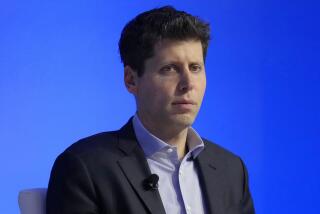At Andersen, Ex-Fed Chief Is Overseer
- Share via
NEW YORK — Accounting firm Andersen announced Sunday that it has hired former Federal Reserve Board Chairman Paul A. Volcker to head a new internal oversight board to help overhaul the way the company operates.
The accounting giant also said it would cease two practices that have been widely criticized for contributing to the downfall of its former client Enron Corp. Andersen will no longer perform so-called internal audits of U.S. companies for which it does external reviews, and will stop doing some technology consulting work for audit clients.
Andersen’s announcement came a day after Enron released a report that cast blame on Andersen for its role in the collapse of the onetime energy giant. The report by three Enron board members excoriated Andersen for signing off on the accounting of partnerships that lay behind Enron’s Chapter 11 bankruptcy filing.
Although Andersen defended itself against the Enron accusations, it nonetheless said Sunday that it envisions making significant changes to restore its tattered image.
“We want to improve our standing in the public’s mind,” said Joseph F. Berardino, Andersen’s chief executive, at a news conference in Manhattan. “Nobody’s going to be more difficult on this firm than this firm.”
The creation of an oversight board could be a significant step in overhauling disputed practices at Andersen, depending on how much power the committee is granted, said Mark Cheffers, chief executive of AccountingMalpractice.com, an educational Web site for accountants.
“It’s a meaningful step and a bold step provided that it is a real functioning oversight committee,” Cheffers said.
Nevertheless, Andersen’s announcement underscored the desperate moves it is undertaking to hang on to customers and to avert financial problems, Cheffers said.
As Enron’s auditor, Andersen has been under fire for giving its blessing to the energy company’s flawed financial statements.
Andersen was paid $5.7 million from 1997 to 2001 for reviewing two off-the-books partnerships that are at the center of Enron’s collapse, according to the Enron report.
Given that the average hourly accounting fee is about $250, the total fee indicates that Andersen was deeply involved in reviewing the deals, Cheffers said.
In 2000, Enron paid Andersen $25 million for auditing services and an additional $27 million for consulting work.
The widespread practice of the Big Five accounting firms selling consulting services to their clients is under scrutiny by federal regulators and Congress.
Andersen’s new policy, unveiled ahead of Berardino’s scheduled testimony Tuesday before a House subcommittee, appears to be a preemptive move to temper critics calling for regulatory and other industry changes.
At the same time, Andersen is being investigated by various congressional committees and federal regulators over its shredding of Enron-related documents.
Many experts believe that Andersen will not be able to continue in its current form. It faces scores of lawsuits from aggrieved investors, and many say the firm eventually will be forced to accept a merger with another of the four large accounting firms.
Volcker, 74, said he accepted the unpaid position heading the oversight board because he believes it will lead to industrywide reforms.
Volcker has championed accounting-reform proposals. He has been in favor of limiting the amount of consulting work that accountants can do for their audit clients.
“I would like to see Andersen return to leadership in the industry, but my interest is well beyond Arthur Andersen,” Volcker said. “Accounting and auditing in this country is in a state of crisis.”
Volcker guided the Federal Reserve from 1979 to 1987 and is credited with helping staunch the runaway inflation of the late 1970s and early 1980s.
Volcker spent most of his career in government service. After being succeeded at the Fed by Alan Greenspan, he worked at a small New York investment bank. He is involved in various public service activities, including the chairing of an international accounting-standards group.
The oversight board at Andersen probably would consist of three members, Volcker said. The other two will be chosen in the near future, he said.
Berardino indicated that the oversight board would have strong authority to order broad changes in Andersen practices. However, the exact extent of that authority was unclear.
A written contract between Volcker and Andersen said the board would have the power to “mandate revisions to policies and procedures and/or to implement such additional policies and initiatives as it deems necessary.”
Andersen “agrees to be bound by the determinations of the oversight board,” the contract said.
“We have given Mr. Volcker and this oversight board the strongest of mandates to advise us and to mandate changes where they think it’s appropriate,” Berardino said.
At one point, Berardino laughed and said, “We haven’t got much choice.”
However, he added later, “Where that line is between management’s [prerogative] and advice is always going to be an interesting conversation.”
Volcker said he would not have accepted the ombudsman role without the assurance of decision-making power.
“There’s no chance I would be here today if I did not think that the oversight board was going to have strong authority,” Volcker said.
He added that the scope of his panel could be “almost unprecedented in American business to look over the shoulders of these people and insist that the changes be made.”
The new policies mark a change for Berardino, who spearheaded an effort two years ago that blunted efforts to curtail accountants from doing consulting work for their auditing clients.
Indeed, Andersen on Sunday stopped well short of saying it would cease all consulting work for auditing clients. “We fully intend to build our consulting practice,” Berardino said.
More to Read
Inside the business of entertainment
The Wide Shot brings you news, analysis and insights on everything from streaming wars to production — and what it all means for the future.
You may occasionally receive promotional content from the Los Angeles Times.










